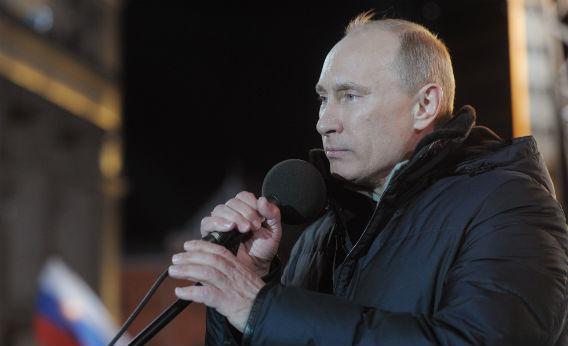During a democratic election, we journalists usually cover certain bases. We analyze the candidates and their views. We print polls reflecting the public’s views. Afterward we discuss the vote—who won, who lost, and why.
The coverage of a managed election, of the kind that took place in Russia on Sunday, is necessarily different. The candidates’ views are irrelevant; the public’s views are of marginal interest. The question of who won and who lost is also uninteresting, since everyone, even those who are paid to pretend otherwise, know the outcome has been predetermined. A couple of weeks ago, I found myself in conversation with the Russian ambassador to a European capital. I asked him who the next president of his country would be. “I have no idea,” he said. And then, to his credit, he laughed.
In truth, what matters during a managed election is not the election but the management. How convincing was the propaganda? How expertly did the authorities deflect dissent? The point of a managed election, after all, is not to pick a winner but to reinforce the legitimacy of an illegitimate regime.
By those criteria, last weekend’s Russian election did achieve some successes. Apparently, millions of people did actually vote—some 64 percent, according to (possibly exaggerated) official statistics, though outsiders report “brisk” turnout as well. This is a major achievement for the second Putin presidential regime: It implies that a lot of Russians still believe, at some level, that participation matters, even if the outcome is known well in advance.
The regime also scored some points by not overstating its victory too much. Had Vladimir Putin followed in the footsteps of President Alexander Lukashenko of Belarus, who claimed an utterly implausible 80 percent victory in 2010, he would have made himself look foolish. As it was, the 64 percent Putin claimed is just barely plausible—independent monitors think the real number hovered around 50 percent—but at least he conceded that some other people might have received votes, giving the whole exercise a thin veneer of respectability.
The regime’s decision to tolerate a handful of mass protests in Moscow, at least in the run-up to polling day, was also successful. There were no corpses or bloodied demonstrators on the world’s television screens in the days before the election, and thus no loud Western condemnations, which might have echoed in Russia. Demonstrations in the capital did not, in fact, spread much around the country—cold weather helped—and thus the opposition movement could be plausibly dismissed as an urban hipster phenomenon.
But there were also some important failures. Putin’s victory speech on Sunday was a big one. Before voting had even finished in Russia’s far east, he declared himself the winner using the kind of emotional language usually deployed at the end of a long war. He denounced “attempts to destroy Russia’s statehood and usurp power,” and he appeared to weep as he told supporters, “I promised you we would win. We have won. Glory to Russia!” Later, his spokesman blamed the wind for the copious tears, but the damage was done: If you have just won an election in which you had no genuine opponents—all of the other candidates were regime-approved—and if hundreds of people have reported massive electoral fraud, you shouldn’t overstate the moral significance of your victory.
It’s a tough line to tread, of course. One the one hand, an authoritarian leader who has prevailed in a managed election has to keep up appearances and pretend that the voting mattered. On the other hand, he can’t assume that all challenges to his legitimacy will now automatically disappear. Above all, he must be careful not to make himself look silly. A lot of people will tolerate a little bit of pretense, but fewer will tolerate aggressive lies of the kind Putin told on Sunday evening. If Putin becomes carried away by his own falsehoods—if he really begins to believe that all of his opponents are in the pay of Hillary Clinton, for example, and acts accordingly—he might risk a major backlash.
Perhaps one will come. But it hasn’t yet. Despite criticism inside and outside Russia, despite witty jokes at his expense, despite Internet and street protests, Putin has won in the only way that really matters: Once again, he is president of Russia. The struggle to rid Russia of his corrupt and venal regime has only just begun.
